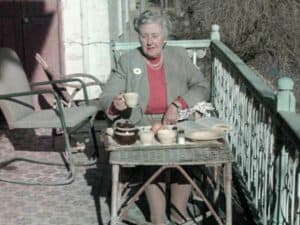
Today, while reading Lewis Carroll’s Through the Looking Glass, the line “Come, tell me how you live!” suddenly jumped out at me. I immediately looked at another book lying right next to me, this one by Agatha Christie, called Come, Tell Me How You Live. I could hardly believe it.
I opened the Christie book, which I had not yet started, and turning a page, there was the whole song I had just been reading! It was not just a flight of my imagination, the title of her book is, in fact, from Through the Looking Glass.
Just after the table of contents and a list of illustrations, at the top of the first page, is the title of the song the line was taken from, and beneath that, between parentheses, Christie has added, “With apologies to Lewis Carroll.” And then (Oh!) I noticed the difference: The title she gives is “A-Sitting on a Tell.” In Through the Looking Glass, the title is “A-Sitting On a Gate.” And in fact, Christie’s words to the song are entirely different! Oh, my God! She did a blatant riff on Lewis Carroll’s song, thus the apologies! She made her very own version of it, in a very self-deprecating and funny re-telling of how she met her second husband, Max Mallowan, an archeologist, asking him more than once, “Tell me how you live.”
Come, Tell me How You Live is a non-fiction book that I’d very much wanted after reading about it in a book called Agatha Christie: The Woman and Her Mysteries by Gillian Gill. Christie’s book is about archeological digs, told from her personal perspective, as she spent several months of each year at digs with her husband. What I found interesting and charming when learning about it, and one of the main reasons I wanted to read it, is the way that Christie herself would help with the work at the digs: cleaning objects, taking photographs, and doing whatever else needed doing, in between writing mysteries on a typewriter in one of the tents.
I can see why Agatha Christie would have liked using a line from Through the Looking Glass. The book is about a world that is very familiar but also very different, distorted because everything is mirrored, and it’s about finding out how that world works. It is clearly appropriate as an analogy for how and why archeologists dig, which is to understand a world very familiar but also very different, in this case distorted by time, rather than a mirror.
Quite a few of Christie’s book titles are taken from children’s rhymes or stories, so it wouldn’t be unusual for her to use a Lewis Carroll quote for this one, but without knowing that she’d done so the title had struck me as a little odd at first. I would have thought “Show Me How You Live,” rather than ‘Tell Me,” would make a better title, since the work of archeology seems to rest so heavily on visual clues to create a story of how a people used to live. The word ‘Come’ seemed curious to me too, slightly off, and yet the title worked for catching my attention. It seemed to ask something of the reader, giving it a cryptic quality, and at the same time inviting readers to come along with her. Her title was not simply imploring people from times past to give up more information about their lives, which to me seemed a more obvious interpretation, because as Agatha Christie writes in her foreword, “It is the question, too, that Archæology asks of the Past—Come, tell me how you lived?” In various ways the book is an answer to the question the title asks, the question she asked Max Mallowan in her version of Carroll’s song, the question she was often being asked herself by the time she wrote the book.
This little find made me wonder whether people were still more familiar with Lewis Carroll in 1946, when Come, Tell Me How You Live was published, than they are today, familiar enough to recognize where the title came from. Would many people still recognize that line now? And would the answers to these questions be different, for example, in the UK than they would be in the US? I can’t really answer this from my Dutch perspective, because I don’t think Lewis Carroll has been as popular in the Netherlands as in some of the English-speaking countries, and also because of course the Dutch are more likely to have read Through the Looking Glass in Dutch, which might prevent immediate recognition anyway.
A find like this feels like stumbling across a jewel, partly because of what a coincidence it is. Had I just opened Christie’s book and seen the reference to Through the Looking Glass I would have liked it, but it wouldn’t have given me the same little thrill. The fluky nature of the discovery, to just be reading Through the Looking Glass for the first time with Come, Tell Me How You Live on my bedside table ready to read next, is a little treasure for me to keep.